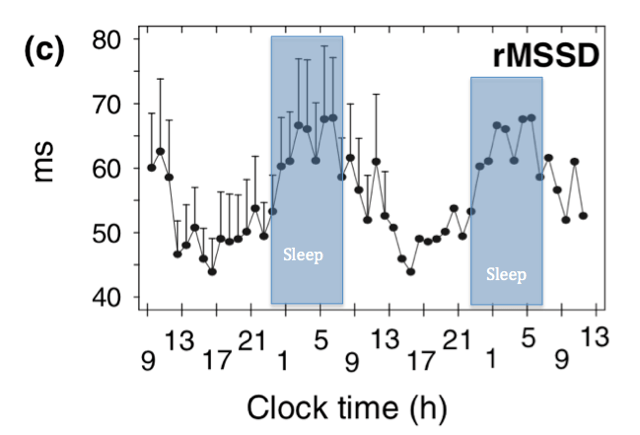What are they and why do we care about them when measuring HRV?
Circadian rhythms are 24 hour changes in our mental and physical that correspond to light/dark wake and sleep cycles.
They are brought about mainly by hormones and in particular melatonin, which makes us fall asleep and stay asleep, and cortisol, which wakes us up in the morning to get us ready for action. As all of us who have travelled across time zones appreciate, these rhythms become synchronized with our body clock, and take some time to adjust to a new sleep and wake time pattern (typically 1 day per hour of time zone change).
This chart is taken from a study in the Journal of Sleep research (Vandewalle, 2007) and shows how heart rate variability (HRV) varies throughout this daily cycle.  HRV is lower during the daytime hours, and increases significantly during sleep time, when rebuilding and recovery take over from daytime stresses.
HRV is lower during the daytime hours, and increases significantly during sleep time, when rebuilding and recovery take over from daytime stresses.
As the usual wake time approaches (7am in this example), the brain stimulates production of cortisol, flushing away the soporific effects of melatonin, and getting us ready for activity. HRV reduces as a consequence, and undergoes a series of peaks and troughs before rising once again during the next sleep period.
This is why it’s important to record your HRV at the same point in this circadian cycle every day. In this example, the difference between highest and lowest daytime values is almost 7 points on the ithlete scale – easily enough to make the difference between a good and a bad score for most users.
What’s also interesting to note is what happens when you have to get up and take your ithlete measurement much earlier than normal. The cortisol awakening response might still be dormant, and you would get a higher score than usual, perhaps by 3 ithlete points or more. So it’s important not only to keep a regular routine for HRV to be most useful, but also to discount readings taken much earlier (or later) than usual. There are also implications for shift workers, and measures should be made at the most frequent waking time, and perhaps not on other days.
#TuesdayTip: Consistency is key, always take your ithlete HRV measurement at the same point in your circadian rhythm!

A quick question: Just how important is it to be extremely precise? Having kids, I usually wake up somewhere between 5-6 am, but never at the exact same time, and I usually go straight to the bathroom to take the reading. Is it a problem that the time varries by 30-60 minutes from day to day based on the above? I would guess, that this is as much cicardian rythm my body gets anyway. Thoughts?
Hi Jay
As a first reaction, I would say that 30-60 mins (max) variation would be OK, but that is just based on personal experience. One of the things we hope to get out of the data mining exercise we are doing with the University of Edinburgh (http://www.myithlete.com/we-need-your-data/) is a better understanding of how much measurement time affects readings and the indications derived from them. I would speculate that on the early side, there might be a threshold where if you take your reading eg 1hr earlier than usual, your cortisol awakening response has not started and the reading would therefore be quite a bit higher than expected. I also suspect we would see a more gradual effect going the other way ie toward later in the morning.